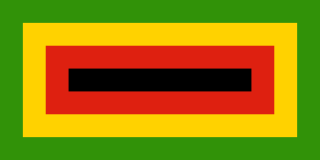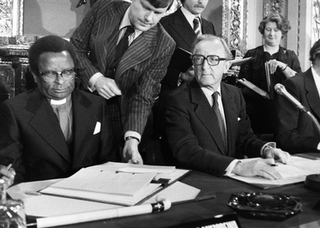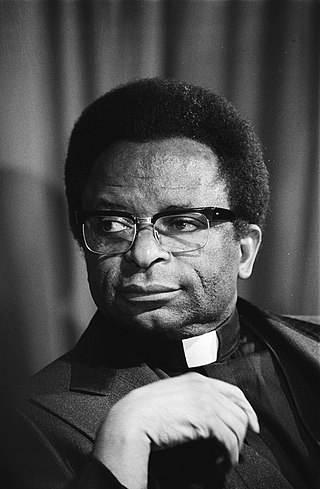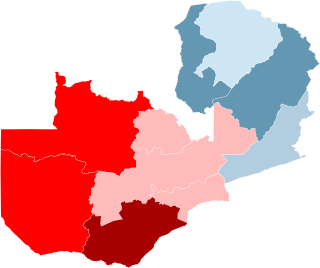
The politics of Zimbabwe occurs in a society deeply divided along lines of race, ethnicity, gender and geography. The ZANU–PF party has historically been dominant in Zimbabwe politics. The party, which was led by Robert Mugabe from 1980 to 2017, has used the powers of the state to intimidate, imprison and otherwise hobble political opposition in Zimbabwe, as well as use state funds and state media to advance the interests of the party.

The economy of Zimbabwe is a gold standard based economy. Zimbabwe has a $44 billion dollar informal economy in PPP terms which translates to 64.1% of the total economy. Agriculture and mining largely contribute to exports. The economy is estimated to be at $73 billion at the end of 2023.

The Enabling Act of 1933, officially titled Gesetz zur Behebung der Not von Volk und Reich, was a law that gave the German Cabinet – most importantly, the Chancellor – the power to make and enforce laws without the involvement of the Reichstag or Weimar President Paul von Hindenburg, leading to the rise of Nazi Germany. Critically, the Enabling Act allowed the Chancellor to bypass the system of checks and balances in the government.
In political science, a political system means the form of political organization that can be observed, recognised or otherwise declared by a society or state.

Zimbabwe Rhodesia, alternatively known as Zimbabwe-Rhodesia, also informally known as Zimbabwe or Rhodesia, was a short-lived sovereign state that existed from 1 June 1979 to 18 April 1980, though it lacked international recognition. Zimbabwe Rhodesia was preceded by another state named the Republic of Rhodesia and was briefly under a British-supervised transitional government sometimes referred to as a reestablished Southern Rhodesia, which according to British constitutional theory had remained the lawful government in the area after Unilateral Declaration of Independence (UDI) in 1965. About three months later, the re-established colony of Southern Rhodesia was granted internationally-recognized independence within the Commonwealth as the Republic of Zimbabwe.

The Zimbabwe African National Union – Patriotic Front (ZANU–PF) is a political organisation which has been the ruling party of Zimbabwe since independence in 1980. The party was led for many years by Robert Mugabe, first as prime minister with the Zimbabwe African National Union (ZANU) and then as president from 1987 after the merger with the Zimbabwe African People's Union (ZAPU) and retaining the name ZANU–PF, until 2017, when he was removed as leader.

The Lancaster House Agreement is an agreement signed on 21 December 1979 in Lancaster House, following the conclusion of a constitutional conference where different parties discussed the future of Zimbabwe Rhodesia, formerly known as Rhodesia. The agreement effectively concluded the Rhodesian Bush War. It also marked the nullification of Rhodesia's Unilateral Declaration of Independence, as British colonial authority was to be restored for a transition period, during which free elections under supervision by the British government would take place. Crucially, ZANU and ZAPU, the political wings of ZANLA and ZIPRA, would be permitted to stand candidates in the forthcoming elections. This was however conditional to compliance with the ceasefire and the verified absence of voter intimidation.

The Zimbabwe government consists of an elected head of state, the president, and a legislature. The presidential term lasts for 5 years, and is elected by majority, with a second round if no candidate receives a majority in the first round. The Parliament is bicameral, consisting of the House of Assembly and Senate. Following the 2013 constitution, the House of Assembly has 270 members. 210 are elected for five-year terms by single-member constituencies. Furthermore, the constitution specifies that for the two first parliaments, there are 60 additional seats reserved for women, 6 seats per province, which are filled based on the votes for in the single-member constituencies, using party-list proportional representation, distributed using the largest remainder method and the hare quota. The Senate has 80 members: 60 are elected for five-year terms in 6-member constituencies representing one of the 10 provinces, elected based on the votes in the lower house election, using party-list proportional representation, distributed using the hare quota. Additionally the senate consists of 2 seats for each non-metropolitan district of Zimbabwe elected by each provincial assembly of chiefs using SNTV, 1 seat each for the president and deputy president of the National Council of Chiefs and 1 male and 1 female seat for people with disabilities elected on separate ballots using FPTP by an electoral college designated by the National Disability Board.
The Central Intelligence Organisation (CIO) is the national intelligence agency of Zimbabwe. It was conceived as the external intelligence-gathering arm of the British South Africa Police Special Branch in the early 1960s, under the Southern Rhodesian Prime Minister Winston Field, and later served as one of the secret police organizations for President Robert Mugabe's regime.

The Internal Settlement was an agreement which was signed on 3 March 1978 between Prime Minister of Rhodesia Ian Smith and the moderate African nationalist leaders comprising Bishop Abel Muzorewa, Ndabaningi Sithole and Senator Chief Jeremiah Chirau. After almost 15 years of the Rhodesian Bush War, and under pressure from the sanctions placed on Rhodesia by the international community, and political pressure from South Africa, the United Kingdom, and the United States, the Rhodesian government met with some of the internally based moderate African nationalist leaders in order to reach an agreement on the political future for the country.
The following lists events that happened during 2005 in the Republic of Zimbabwe.

General elections were held in Rhodesia in April 1979, the first where the majority black population elected the majority of seats in parliament. The elections were held following the Internal Settlement negotiated by the Rhodesian Front government of Ian Smith and were intended to provide a peaceful transition to majority rule on terms not harmful to White Rhodesians. In accordance with the Internal Settlement, on 1 June, Rhodesia officially became the nation of Zimbabwe Rhodesia, under the government of the United African National Council elected in the 1979 elections. The Internal Settlement was not approved internationally but the incoming government under Bishop Abel Muzorewa did decide to participate in the Lancaster House talks which led to the end of the dispute and the creation of Zimbabwe.

General elections were held in Southern Rhodesia between 14 February and 4 March 1980 to elect the members of the House of Assembly of the first Parliament of the independent Zimbabwe. As stipulated by the new Constitution of Zimbabwe produced by the Lancaster House Conference, the new House of Assembly was to comprise 100 members, 80 of whom would be elected proportionally by province by all adult citizens on a common roll, and 20 of whom would be elected in single-member constituencies by whites on a separate roll.
John Landa Nkomo was a Zimbabwean politician who served as Vice-President of Zimbabwe from 2009 to 2013. After serving for years as a minister in the government of Zimbabwe, he was the Speaker of Parliament from 2005 to 2008. He was then appointed to the Senate in 2008 and was Minister of State in the President's Office in 2009. Nkomo was also a key figure in the Zimbabwe African National Union – Patriotic Front (ZANU–PF); he was National Chairman of ZANU–PF until December 2009, when he was elected as Vice President of ZANU–PF. As a consequence of his elevation to the party's vice presidency, he also became Vice President of Zimbabwe in December 2009.

Abortion in Malta is illegal except in cases where the life of the pregnant woman is at risk. Until 2023, it was illegal without exception. Malta has the most restrictive laws regarding abortion in Europe with the law in Malta held to be influenced by Roman Catholic Christianity, which formed part of the identity of 82% of the population according to the 2021 census.

The Ukrainian anti-protest laws were a group of ten laws restricting freedom of speech and freedom of assembly passed by the Verkhovna Rada on January 16, 2014 and signed into law by President Viktor Yanukovych the following day, amid massive anti-government protests known as “Euromaidan” that started in November. The laws were collectively referred to as the "laws on dictatorship", by Euromaidan activists, non-governmental organizations, scholars, and the Ukrainian media.

Cannabis in South Africa is an indigenous plant with a rich historical, social, and cultural significance for various communities. South Africa’s cannabis policy evolution has been marked by significant shifts, particularly following decriminalisation by the Constitutional Court in 2018, and the passing of the Cannabis for Private Purposes Bill in May 2024.
Botswana held a general election in October 2019. Though it was more competitive than previous elections, it resulted in a victory for the ruling Botswana Democratic Party (BDP) and won an addition term for President Mokgweetsi Masisi. Botswana saw an escalation in the rivalry between Masisi and his predecessor Ian Khama, with Khama leaving the Botswana Democratic Party to support the Botswana Patriotic Front and the Umbrella for Democratic Change. Following the BDP's victory, opposition leaders challenged the results of the election.

General elections were held in Zambia on 12 August 2021 to elect the President, National Assembly, mayors, council chairs and councillors. Hakainde Hichilema of the United Party for National Development was elected president, defeating incumbent Edgar Lungu of the Patriotic Front.

The Citizens Coalition for Change (CCC) is a Zimbabwean political party. It was established by former members of the Movement for Democratic Change Alliance.














